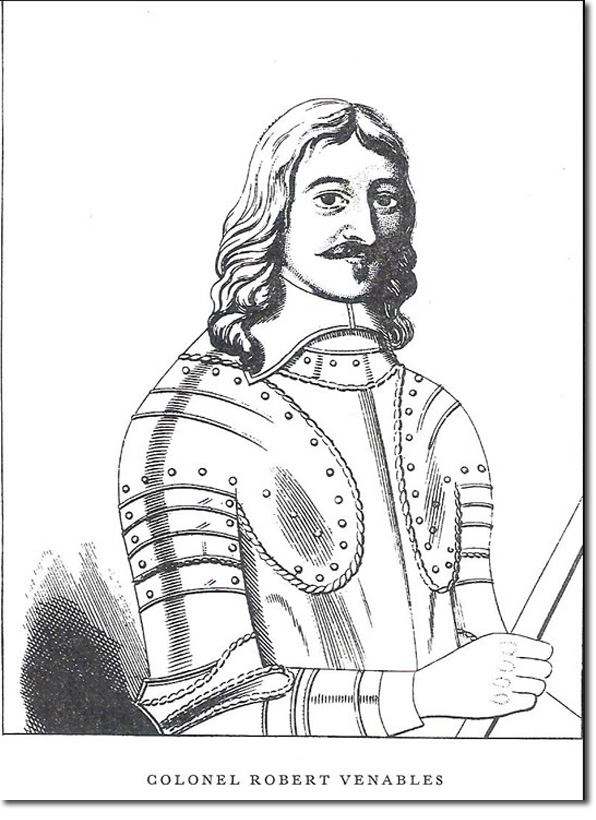|
|


|
|
In 1654, Robert Venables was asked by Cromwell to command a military expedition to the Spanish West Indies. It was a big promotion to put him in charge of what was intended to be the first stage of a fundamental assault on the Spanish islands and mainland colonies in and around the Caribbean.
The Council of War decided to share authority over the campaign between a general (Venables) and an admiral (William Penn) who had to make decisions with the advice and consent of three civilians with extensive knowledge of the Caribbean. This group, with other veteran merchants from the area, planned the expedition. They put together an army of with a core of trained soldiers but mostly 'volunteers'. They ordered the wrong food and forgot to take anything for storing water--this on a tropical campaign. They had thirty-eight sound vessels to convey them and to take on any Spanish naval vessels they encountered. The commanders were given a free choice of target and considered Hispaniola (Dominica), St John's Island (Puerto Rico), or the area to the south of the Orinoco. Once they reached the Bahamas and took on extra supplies and 2000 extra troops, they decided on Hispaniola. It was intrinsically a good choice for it was fertile and well placed to launch further expeditions.
They sailed in the last fortnight of December in two squadrons, and arrived four weeks later in Barbados. They refreshed themselves, planned their expedition for two months and then sailed for Hispaniola, arriving on 13 April. By this time Venables and Penn were barely on speaking terms, and full of so much mutual mistrust that Venables seems genuinely to have suspected that Penn would offload him and his men and depart, leaving them marooned. There were bitter disputes about the division of supplies and inadequate contingency plans for Penn to come to Venables's assistance if he got into trouble. The weather was foul: torrential tropical rain that ruined the gunpowder, caused the biscuits to rot, and made the rivers unfordable. Over-confident planning and under-confident soldiers proved a fatal combination. Having telegraphed their intentions to the Spaniards, they lost the element of surprise. After landing with 8000 men 40 miles from San Domingo they marched disconsolately through inhospitable wooded terrain and were twice ambushed by the Spanish (18 and 25 April). Venables lost about a third of his men and, bitterly complaining of their cowardice, got Penn to take him and the remainder off, though not without some delay. Very much as a means of saving face and seeking a compensatory triumph, Venables ordered Penn to take him to Jamaica, a less developed and economically (as it seemed) less promising island. Here he quickly gained a pyrrhic victory. He landed on 10 May and took the surrender of the capital on 17 May, but not before much of the garrison and many of the inhabitants had taken to the hills. Venables was faced with the prospect of a guerrilla campaign as stubborn as that fought back in Ireland. He began the thankless task of rooting them out, but fell ill with a tropical fever. Penn, fearing the consequences of this failure, abandoned Venables, and sailed for home with half the fleet on 25 June, determined to get his side of the story in first. On discovering this, Venables set off in hot pursuit in a vessel called the Marston Moor, but he failed to overtake Penn. He arrived in Portsmouth on 9 September 1655 'almost a skeleton, and so weak he could neither stand nor ride'. This did not spare him (or Penn) a spell in the Tower of London as a wrathful council and a distraught Cromwell (brooding on why God had deserted him in this great cause in which he had invested much hope) pondered whom to hold responsible. On 30 October Venables was released from prison but relieved of all his military commands. He retreated to Cheshire, far from the complaints of Cromwell if not those of Mrs Venables. He was effectively in disgrace for the rest of the protectorate. Venables's was a life of frustration. He served loyally in the civil war in England, and tenaciously in Ireland from 1649 to 1654. But he never received the recognition he deserved and he had to spend the years of peace seeking compensation for what he was owed. He was over-promoted and under-supported in a high-profile fiasco in the Caribbean that cost him his reputation. He died at Wincham in his seventy-fifth year, and was buried in July 1687. |
Jamaica | Jamaica Administrators | Jamaica Individuals
Armed Forces | Art and Culture | Articles | Biographies | Colonies | Discussion | Glossary | Home | Library | Links | Map Room | Sources and Media | Science and Technology | Search | Student Zone | Timelines | TV & Film | Wargames